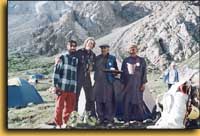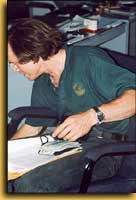Dusharin: "They introduced the liaison officer to us in Islamabad. He was a Ministry
representative. The responsibilities of a liaison officer are the following. He is to see
that the expedition is running according to the contract. He should also solve all the
current problems. Our liaison officer was a young oriental man, a regular officer of the
Pakistani Army. With the help of his acquaintances Carlos found out some facts about that
man and started pressing for his substitution without delay. It didn't work. The liaison
officer was the protégé of some bigwig from the Ministry and was making his career. Our
"twice an officer" considered himself to be a watchful guardian of foundations,
trying to save them from strangers. It was clear to us that all wouldn't end well. |

Liaison officer, Carlos Buhler, Ali Madat and his assistant Aub Khan at the Base
Camp
|
|
He showed his nature from the very beginning trying to foil or delay the start of the
expedition. According to the contract we had to provide him with the equipment to work in
the mountains. He refused to take any of the suggested equipment. It caused the officials
from the Ministry and the Agency of Tourism to get involved. He was of no good to the
expedition. We even had to take care of his health (he got sick) and to send him from the
base camp to the place where it would be safer for him. Everything ended up with
troubles". |
Volkov: "He tried to obtain quick promotion. We acknowledge our guilt too. We had
found our documents on the satellite phone registered incorrectly. Right at the beginning
of the expedition he had sent messengers with a report about it. By the time we came back
to Islamabad everyone knew about it. At a minimum, we were prepared for the worst: to pay
the fine and to have our permission to enter Pakistan denied. There was even a possibility
of being jailed. We were not joking. Carlos was preparing to have trouble. He understood
that while the fact is not publicly disclosed, the problem could be smothered up, but it
gets very difficult when the case gains publicity.
Our liaison officer had prepared for that beforehand. What was interesting is that he
decided to show off. It was a real school for me. He tried to keep friendly relationships
with us, especially at the end of the expedition in order to make the problems caused to
be more serious. We came to Islamabad to our last formal briefing. Two or three hours
before that he came to the head of the department that gives permits and gave him a
detailed description of all our "misdoing".
And when the final briefing began the head of that department was very strict with us.
There was a scandal coming. He asked a liaison officer to write down all the things we did
wrong and all laws of Pakistan we ignored. The officer refused to declare it in a written
form. The boss turned out to be in a difficult situation. Carlos started putting him under
pressure. He said that everything was a lie and that there isn't any reason to trust that
man. Carlos declared it publicly. People there are raised in English traditions and they
take things declared in the office seriously. Very seriously. It was very clear that
everybody flew into a rage except that they didn't strike each other in the face… |
It is hard to explain how difficult it was to complete all the formalities of the
expedition. It was so amazingly hard that Carlos not being a sensitive person had said,
"I promise that four or five years nothing would make me to go to Pakistan". It
was known that he had been on expeditions in Pakistan nine times. The mountains are really
beautiful over there. He is a real expert on Pakistan.
Three days later, when we flew back home, Carlos said that organizing and conducting the
expedition took 80% of his physical and psychological energy. The mountain work itself
took only 15% to 20% of his psychological, intellectual, human and physical
resources." |

Carlos Buhler at work
|
|
|
